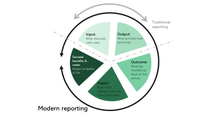Sustainability
Value to Society
We want to contribute to a world that provides a viable future with enhanced quality of life for everyone. We have anchored this in our corporate purpose “We create chemistry for a sustainable future”. But how do we know that we are working on the right issues? And how do we know whether our current efforts are already sufficiently balancing the three fields of action - economy, society and environment? Our goal is to make value measurable. In this way, the value-to-society approach is a first step towards a transparent future.

Social
The social factor includes measurable variables such as human capital, wages, health & safety and taxes.
Economic
The economic factor includes measurable variables such as net profit, amortization and depreciation.
Environmental
The ecological factor includes measurable variables such as air and water pollution, CO2 emissions, waste and land and water consumption.
Reporting our Value to Society since 2013
There is no standardized approach to determine the value contribution of a company. Worldwide there is a lack of consistent standards for measuring the overall impact of companies, covering economic, environmental and social aspects of business activities along the value chain.
For this reason, we developed the Value to Society approach in 2013 together with external experts to close this methodological gap and have been publishing annual evaluations since then. They enable us to gain a fundamental understanding of our contribution to a sustainable future. They also enable us to compare the significance of financial and non-financial impacts of our business activities on society and to highlight their interactions.
Value to Society at a glance
We show how chemistry enables sustainable growth.
- We have a macro-societal view of the economic, social and ecological effects of our business activities along the entire value chain.
- Together with our partners, our business activities make a clearly positive overall contribution to society.
- We contribute our approach and expertise to current debates on the monetary assessment of the economic, ecological and social impacts of business activities. We share our experience in networks and contribute to corresponding standardization processes.
- Our approach is pragmatic, efficient, auditable and transferable.
The Value Balancing Alliance, of which BASF is a founding member, aims to establish a cross-company standardization of reporting in which the Value to Society approach functions as a pilot project. For further information see below.
Creating transparency about impact
By measuring and monetary evaluating our business activities, we can understand the significance of financial and non-financial impact on society even better than before, compare them directly with each other and highlight their interactions. This transparency supports our integrated approach and thus contributes to BASF's long-term success.
The results show that the positive contributions clearly outweigh the negative effects at BASF and in our value chain. The driving positive factors are taxes paid, wages, social benefits, employee training and net income. The negative contribution results from environmental impacts such as CO2 emissions, land use and emissions to air, soil and water, as well as health and safety incidents.
The Macro Perspective of the Value to Society Approach

By-products and results of production within the value chain, such as production-related carbon emissions
Consideration of the direct and indirect long-term effects of value creation such as the analysis of changes in climate patterns
Considerations of the effects on human health and the environment that would not have occurred without the added value.
Monetary assessment of the impact on the quality of life, such as the social cost of carbon emissions in euros.
Raw materials that are used within the value chain.
Modern reporting: Focus on impact
We aim to increase our positive contributions and minimize the negative impact of our business activities. The Value to Society approach enables us to create transparency of our value contribution, to monitor progress on an ongoing basis, and to complement our existing concepts for assessing risks and business opportunities with a macro perspective.
Value to Society Method
Standardization Processes
Value Balancing Alliance
The Value Balancing Alliance (VBA) is an initiative co-founded by BASF that aims to use the knowledge and practical experience of commercial enterprises to close the methodological gap and introduce an accounting and reporting standard. Over the next three years, the aim is to work together to develop a standardized methodology with which companies can present their economic, social and ecological value contributions in such a way that they can be compared with the performance of other companies. BASF's Value to Society approach is a first step on this path and makes a significant contribution to achieving the alliance's goal.



